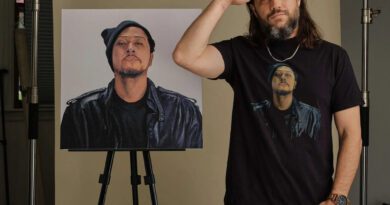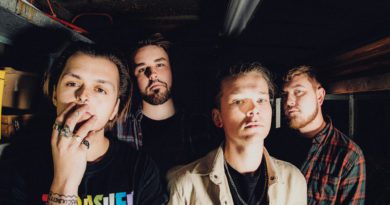A Chat with Sone (05.05.25)
Sone emerges as an artist unafraid to fuse vulnerability with vocal prowess. Her new single ‘Rollercoaster’ is more than just a title as it’s a reflection of her emotional resilience, creative evolution, and genre-defying ambition. From the depths of personal struggle in a Milan apartment to shaping a distinctive soundscape alongside Théo Laurent-Vitale in Paris, Sone’s journey is a testament to radical honesty and fearless experimentation. We speak with Sone about ‘Rollercoaster’, social media, and much more.
OSR: ‘Rollercoaster’ feels both deeply personal and sonically grand. Can you take us back to the moment you wrote the first lyric?
Sone: I started writing this song while I was modelling in Italy a couple of years ago, actually. I have a history with eating disorders, and at this point, I was quite unhealthy, mentally and physically. I was staying in a modelling apartment in Milan, and I was struggling with what was happening in my mind versus being social and having a good time with others. Every day I woke up with a different mood or relationship with myself, and it felt like I could work my way up all day to getting myself to be positive and then one moment could tear it down. I remember getting up in the middle of the night, and I had this melody in my head – and I was asking myself, “why am I so emotional / why does my head spin like this?”. And that’s where the song started. And it evolved into something a lot more positive.
OSR: You’ve said this song was inspired by your emotional highs and lows. What helped you go from seeing that as a weakness to a strength?
Sone: Sometimes you can wake up and have a great mood, and then go through your day like “oh I’m just happy today, I’m not gonna question it”. But when you wake up in a bad mood it’s like “everything sucks and now I’m stuck with a bad day and why is it like this” – I tried to shift this idea in my head like, “ok I’m not feeling so good, but I’m not gonna question it, it’s okay I’ll just let myself be. I can’t expect myself to be feeling great all the time” By doing this, it’s helped me feel more in tune with myself. I let myself feel my lows, I try not to suppress my emotions, and that way I feel more grounded, even though it’s an “up and down”.
OSR: You trained as an opera singer, but now you’re redefining pop on your own terms. Was there a moment when you knew you had to forge your own path?
Sone: I sang pop music my whole life, starting in Russia at 10 years old, I was singing at the Kremlin, and I knew I wanted to be a singer. As I got older, I wanted to train my voice to be able to reach its fullest potential, and so I started to learn how to sing opera. I fell in love with the feeling and strength it gave my voice and body. I continued writing music through my studies in the Conservatory, and the instinct to merge the two came naturally. I wanted to experiment and I wanted to push boundaries with music – there is a big “classical vs pop” culture, and I don’t think it has to be black and white. Music is music, and I just wanted to make something beautiful.
OSR: Working with Théo Laurent-Vitale in Paris must have been a creative experience. How did that collaboration shape the sound of the single?
Sone: Theo is an amazing sound engineer and producer, he’s from Paris but studied at Berkeley in Boston. He has a lot of inspiration from jazz as well as pop. With him, we could have more fun with chords and structure. He taught me about sound engineering and producing, and through the process, I was becoming more and more hands-on. I learned through him how I could express myself and find my sound. When you record a song, there are so many directions you can go. One song can end up sounding so different. A producer is like a photographer – many photographers can take a picture of someone, and that person will look different through each lens and angle. He showed me his point of you but also helped me find what I wanted the picture to look like in the end.
OSR: The track draws comparisons to artists like Gaga and Lana, but your sound is so unique. Who are some unexpected influences people might not guess?
Sone: I definitely get some inspiration from Billie Eilish and Chappel Roan, but also 070Shake and Noga Erez. If you’re not familiar with them, I really recommend checking them out.
OSR: “Popera” isn’t a common genre label. How would you define it, and where do you see it going?
Sone: Popera for me is mixing the structure of a pop song and the vocal techniques of pop with some of the vocal depth and drama of opera. Some of the opera vocals are not in the forefront, but they are added for texture and feeling. Letting yourself be dramatic as an opera can be. Opera has this reputation of only being for the upper class or being posh, but I think it should be for everyone. I want to be able to introduce opera in a new way.
OSR: How do you balance the theatricality of your vocal training with the rawness of pop storytelling?
Sone: Honestly, trial and error. I experiment a lot. Each song has a different ask, if that makes sense. There are moments I feel that the opera enhances the song and moments when it’s not necessary. I want the opera to be a cherry on top and not to be overused. It’s hard to find where that line is, there’s no science to a feeling.
OSR: You’ve performed everywhere from stadiums to street corners. How do those experiences shape how you write and perform today?
Sone: What I’ve noticed is that for me, there is no difference between singing in a stadium or a street corner – connecting with people is my main goal when I sing. I feel like I’m most myself when I’m singing in front of people. I can be vulnerable, and it’s accepted. I think, if anything, it’s helped me to realise that it’s better to be completely honest and open while singing in front of people, and not hide anything. If someone doesn’t like it or doesn’t connect, that’s ok because I’m being honest with myself; it’s a radical acceptance. So my songwriting reflects this.
OSR: With your growing fanbase on social media, how has your relationship with your audience evolved through your music?
Sone: Some people have written to me and told me how my music has helped them, or told me how much they connected with my song, or felt the same way. It makes me so happy. It’s an amazing way to get to know more people, and not to feel alone in my own feelings.
OSR: If ‘Rollercoaster’ is the start of a new chapter, what’s next for Sone, and what can fans expect from the rest of the ride?
Sone: I’m planning on releasing more singles in the near future and performing in live venues. I’m excited to continue this journey and push more boundaries with my music, as well as continuing to experiment.
Many thanks to Sone for speaking with us. Find out more about Sone on her Instagram, Facebook, TikTok, YouTube and Spotify.


